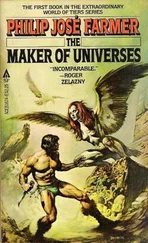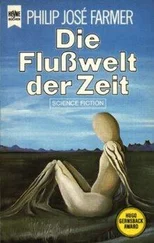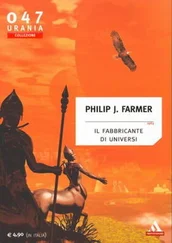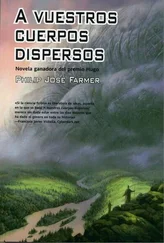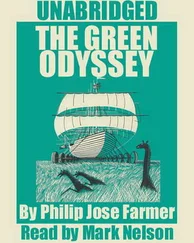Or so he had thought at first. Within a few seconds, it had grown bigger and its throbbing became faster. He hoped that the dog wasn’t going to die of a heart attack.
Suddenly, they were out among the stars. Simon almost screamed with joy. They had made it; they weren’t doomed to ride forever, like some Flying Dutchman, through the lightless, shapeless seas of the boojum.
Then he hastily released his grasp. It wasn’t Anubis’ heart he’d been holding. It was his penis.
Simon apologized to Anubis and then asked the computer to check out the stars in the area. It reported that the ship was in an uncharted area. Simon didn’t care. A man without a home can’t be lost, and one galaxy was as good as another for his purposes.
Simon directed the computer to take the ship to the nearest galaxy and look for an inhabited planet. He went to the captain’s quarters and poured a big drink of rice wine to soothe his nerves. The trouble with Chinese liquor was that it didn’t satisfy. A few minutes after he’d had a shot, he felt as if he needed another. No wonder the ancient Chinese poets were always loaded out of their skulls.
Shut up in the cabin, Simon was able to relax by playing his banjo. The ship was going at only 20X, so the sound from the engine rooms wasn’t loud enough to upset him. But he had to play behind closed doors because the banjo made Anubis howl and gave the owl dysentery. Their reaction hurt Simon’s feelings, but something good came out of it. By backward logic and analogy, he had figured out why his concerts always got such bad reviews. Since animals hated his playing, there must be something bestial in music critics.
A week, ship’s time, passed. Simon studied philosophy and Chinese, cooked meals for himself and his companions, and cleaned up after the dog and the owl. And then, one day, in the middle of his breakfast, the alarm bell rang. Simon ran to the control room and looked at the control panel screen. Translated, the Chinese words said, “Solar system with inhabitable planet approaching.”
Simon ordered the ship to go into orbit around the fourth planet. When the Hwang Ho was over it, Simon looked through a telescope which could pick out objects as small as a mouse on the surface. It looked like a nice planet, Earth-size, no smog, clean oceans, and plenty of forests and grassy plains. All this was easily accounted for. The sentients were in a primitive agricultural stage and probably numbered less than a hundred million people.
What attracted his attention most was a gigantic tower on the edge of the smallest of the two continents. This tower was about a mile wide at its base and two miles high. It was shaped like a candy heart, its point stuck in the ground. A hard metal without a break made up its shell. In fact, it looked as if it had been made from a single casting. But the metal was striped with white, black, yellow, green, and blue. These were not painted on but seemed integral to the metal.
The massive structure looked brand-new. However, it was leaning to one side as if the solid granite under it was giving way to the many billions of tons pressing on it. Eventually, maybe in a million or so years, it would fall. It had been there for about a billion years, long before the human population had evolved from apes or even from shrew-sized insect eaters. Perhaps it had even been erected before life had crawled out of the primeval seas, warm and nutritious as a diabetic’s urine.
Simon knew something about towers like this one, which was why he was delighted to see it. Interstellar voyagers to distant galaxies had reported finding such towers on every inhabited planet of these systems. There were, however, none on the planets of Earth’s galaxy. Nobody knew why, though many resented this slight.
Deciding to investigate the tower first, Simon directed the ship to land on it. The Hwang Ho settled down on a flat area between the two lobes, and Simon and his two pets strolled out. They didn’t stay long. The flat part was covered with thousands of noisy, squabbling, egg-laying, white-and-black-checkered birds and about ten feet of guano. Simon threaded his way through the hook-billed birds, dodging vicious pecks from the mothers when he came too close to the eggs. Simon inspected the lobes, which towered above him as if they were mountains. Their slopes held no windows or doors. They were as unbroken as the passage of time itself, as impenetrable as yesterday.
Simon hadn’t expected to find any entrances. Of the six million towers so far reported by Earth tourists, all had been just like this one. The natives of various planets had tried everything from diamond-tipped drills to laser beams to hydrogen bombs without scratching the mysterious metal. The buildings were hollow. A hammer could make one ring like a gong. There was even one planet which had a symphony orchestra which played only one instrument, the tower. The musicians stood on scaffolds built at various levels along the tower and struck it with hammers, the size and layout of the rooms within determining the notes evoked. The conductor stood on a platform a mile high and half a mile away and used two flags to wigwag his directions.
The highest point of music in the history of this planet occurred when a conductor, Ruboklngshep, fell off the platform. The orchestra, in trying to follow the wildly waving flags during his descent, produced six bars of the most exquisite music ever to be created, though some critics have disparaged the final three notes. Art, like science, sometimes gets its best results by accident.
Simon returned to the ship and found himself in an unforeseen situation. Since the flat area was tilted to one side, the ship had been put down at the lowest point, where the guano had built up to form a horizontal plane. Simon had made sure that the ship would not roll over. But he had forgotten about its enormous weight. It had sunk into the soft guano and so the ports on this side were about twenty feet under the surface and the ports on the other side were too high to reach. There was nothing to do but dig his way through with his bare hands. Anubis wouldn’t help, since he had not buried any bones there. Simon got down on his hands and knees and excavated away. Two hours later, dirty, sweaty, and disgruntled, he broke through and fell into the port. It took a half-hour to clear out the port entrance and another half-hour to clean up himself and the pets.
His usual good spirits returned shortly afterward. He had told himself that he shouldn’t get angry at such a little thing. After all, a man should expect to get his hands dirty if he dug into fundamental issues.
 6
6 
SHALTOON, THE EQUAL-TIME PLANET
Simon ordered the computer to set the ship down on a big field near the largest building of a city. Since this city had the largest population of any on the planet, it should be the capital of the most important nation. The building itself was six stories high and made of some white stone with purple and red veins. From the air it looked like a three-leaf clover with a long stem. Its windows were delta-shaped, and its doors were oval. The roofs were breadloaf-shaped, and the whole building was surrounded by roofless porches on the outer edges of two rows of pillars. The ones on the edge of the porch were upside-down V’s. The others were behind the deltoids and projected from the floor of the porch at a forty-five-degree angle so that their ends stuck through the deltoids. The leaning shafts were cylindrical except for the ends which pierced the deltoids. These terminated in round balls from which a milky water jetted. At their base were two nut-shaped stones, the surfaces of which bore a crisscross of incisions.
Читать дальше
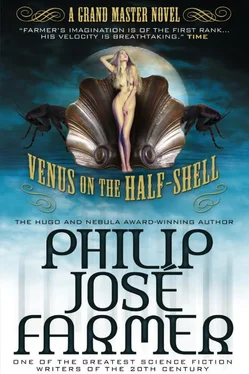
 6
6 

